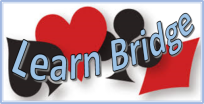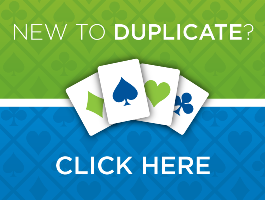Welcome to Duplicate Bridge!
So you've decided to try duplicate bridge and want to know what to expect? Well, come on in! We've been having parties and tournaments, making partnerships and meeting new friends, playing as much fascinating bridge as we want each week, all without having to clean the house, bake or look for a fourth! Across the US, there are 300,000 of us and 350 in the Santa Cruz area. The players are of all ages and conditions and at the Santa Cruz Bridge Center (SCBC) we welcome new duplicate players anytime. We've prepared a video for you and a write-up. After a quick view and read, you'll know what to expect!
Table of Contents
Where Do You Start?
Are You Good Enough To Play? Yes!
Arriving At Your First Game
How The Game Works
Scoring Each Hand
The Game Continues
The Director
End of the Game: How Did You Do?
Are You A Winner?
More Duplicate Bridge Customs
Where Do You Start?
Begin in the Newcomer duplicate game, which is monthly on the 2nd and 4th Wednesdays. This is a restricted game by masterpoints, so you will be playing with others at your level.
There's a 499er game (players with less than 500 masterpoints) Monday evenings at 6PM. Please check the Calendar for specific times, meal options and changes to the regular schedule.
Some games have a free mini-lesson prior to game time. Here you will find information to brush up on your game and learn modern bidding strategy. You will make friends and find partners while you increase your playing speed and skills.
If you must begin in an open game (a mix of newer and experienced players), you may initially find the tempo of the game and the number of deals played exhausting. Duplicate bridge is a sport, and you are essentially coming in without warming up. However; if you and your partner stick it out for a few months, you will have no problem fitting right in and you will learn more quickly because of the higher level of play and the help you'll receive from the advanced players. ↑ToC
Are You Good Enough To Play? Yes!
The quality of play in any duplicate game varies widely. Some players think Stayman is a variety of apple while others are tournament champions aware of many conventions. The fact of the matter is: you don't get good to play duplicate; you play duplicate and then get good. And don't be surprised when your social bridge game improves dramatically as well! ↑ToC
Arriving At Your First Game
Going out to play duplicate bridge is just like going to a movie, except you are in the show. You pay when you enter and you take part in the action. You do not have to dress up. Attire is casual; jeans are fine. Of course, the SCBC is a non-smoking facility.
If you need a partner, contact the director (names, phone numbers and email addresses are on the home page of this website. Then come early and tell the director as soon as you come in so you may be introduced to your partner.
Now pick up a convention card and a pencil. You and your partner can fill this out together. Try to keep it simple for now. You can keep track of the actual contracts and scores on the inside.
That's it! Get yourself a cup of coffee and some snacks, sit down and get ready for fun. ↑ToC
How The Game Works
The director, who runs the game, will place duplicate boards on your table. You will play and then replace the cards in the pockets in order to keep the deals intact for the remainder of the game. You will notice each board has an imprint designating who is dealer and which side is vulnerable.
Count your cards before you look at them. If you don't have 13, call the director! Now, to keep the deal intact for the next round, you place each card face up in front of you on the table as you play -- until the trick is complete. If your side wins the trick, you turn your card face down (still in front of you) vertically so it points toward you and your partner. If you lose the trick, the card is turned horizontally so it points to your opponents. The played cards remain on the table in front of you. At any given time, you can see how many tricks each side has taken by looking at the position of the cards.
You use the bidding box to bid rather than announcing your bids. This keeps the noise level down and keeps other tables, which will soon play the same hands from knowing what contract was reached at your table.
When the deal is complete, and both sides agree on a result, count your cards (to be sure none got mixed with an opponent's) and put them back into the board. Now you are ready to score. ↑ToC
Scoring Each Hand
Duplicate is scored like Chicago or party bridge. If your side makes a contract, you receive your trick score plus a bonus: 50 points if you bid and made a partscore; 300 points if you bid and made a non-Vulnerable game; 500 points if you bid and made a vulnerable game. There are slam bonus added if you bid and make a slam. Each deal stands alone, having no effect on any following deal. The North player at the table will enter the contract and result into the electronic scoring pads (Bridgemates). She then shows the result to you or your partner to verify and "accept" the entry. ↑ToC
The Game Continues...
Next Round. Depending on the size of the game, you will play between two and four boards at each table, and about 18 to 28 deals for the entire game. In an Open game, players are expected to play the deals in a reasonable amount of time, about 7-8 minutes each. This will keep the game moving well and make it enjoyable for all.
When you have finished all your boards at a given table, the director will call the round and direct the movement of the boards and players. Generally, North-South remain stationary while East-West move to the next higher table and the boards go to the next lower table. (In some smaller games, all the players move.)
The Director
Players new to duplicate do not realize the important functions the director "referee" performs. If an "irregularity", such as a lead or bid of of turn occurs, the director is responsible for making a ruling according to the Laws of Duplicate Contract Bridge, that is not only fair to both pairs involved but that will also protect the other pairs who will play the board ("the field"). And as a good director; she must do this in a manner that doesn't embarrass or upset anyone.
She is also responsible for setting up the game, depending on how many tables there are. She sets the tone for the game, keeping it friendly and fun.
Many novices are afraid to call the director on a lead out of turn or a revoke or whatever. They think it makes the game unfriendly. This is wrong on two counts. The director will alleviate any strain there is or that may develop, actually making the game more fun. By calling the director, you will ensure that the game is fair for everybody, not just you and your opponents. Duplicate bridge is a sport the director must put his hands on the ball to get it back into play ↑ToC
End of the Game: How Did You Do?
It is not necessary to hold lots of aces and kings to win at duplicate bridge. Winning is done by comparing how well you did with the cards when you held them as opposed to how the others did with those same cards.
The scoring software ranks each pair according to how well they did in comparison to the other pairs who played the board. You will receive one point (called a match point) for each pair whose result you have beaten and one-half a matchpoint for each pair you have tied.
Example: If a board was played five times, and you scored 420 in a 4H contract, while two others scored 450 (Making five! Where did I lose that overtrick?), one went down 1 (-50) and one forgot to bid game (scoring only 170), you will get two match-points for beating two pairs. The pair who went down will get a zero, a bottom on the board. The folks who made 450 will share a top on the board, getting three and one-half matchpoints (they beat three pairs and tied one). The most matchpoints that were available on that board were four; since it was played five times and the opportunity existed to beat only four other pairs.
An average result on a board would be two matchpoints, so if 20 boards were played in the game, an average score for the entire game would be 40. When you add up all your matchpoints, you will be able to see whether you did better or worse than the average players in that game. You will also be able to see which boards you found troublesome and take the opportunity to discuss them with some nice former opponents. Lasting friendships and partnerships (and sometimes marriages) are made this way!
The Santa Cruz Bridge Center (SCBC) posts game results on the website which allows you and your partner to review your results and better understand how to improve. ↑ToC
Are You A Winner?
If you placed in the top third of your stratification in a game, you will be awarded a prize! In duplicate bridge this comes in the form of masterpoints. The larger the game and the higher you placed, the more masterpoints you will receive. Most newcomers play for a month or two before they win any masterpoints.
Your ranking in the bridge world is reflected by how many masterpoints you have! The number of masterpoints you hold also places you in different stratifications of a game. For example, the lowest "strat", typically the "C" groups lower masterpoint players, so that they compete within that strat to win. The higher ranking players cannot win that strat. ↑ToC
More Duplicate Bridge Customs
Since duplicate bridge involves comparison among many tables and is played more as a competitive sport than as a social game, it is imperative to ensure the greatest possible degree of fairness. Consequently, you may encounter some new situations at your first duplicate game, particularly if you are playing in an open game.
Home bridge players mostly know and play the basic conventions: Blackwood, Stayman, Gerber; takeout doubles. However, many modern players in duplicate bridge have added some other conventions to their game. Remember; a convention is an artificial bid used to describe your hand or to ask or answer a specific question. For example, a 4NT bid often has nothing to do with playing notrump; it asks partner how many aces or Key Cards she has (Blackwood or "1430").
Since her opponents may be unaware that certain bids are artificial, the partner of the player employing a convention may be asked or required to say "ALERT!" The player next to bid may now inquire what the ALERT signifies if he wishes. (You are entitled to know what your opponents' bids mean and the "Alert" gives you the opportunity to ask.) This is only fair.
Another duplicate novelty is the what happens after your immediate Right-Hand Opponent opens with a 2-level or higher bid or makes a jump bid. After waiting 10 seconds, you can make your call, even if it is a Pass. This way no one, including your Partner, knows if you have a fair hand or a bust, as you would do the same behavior in either case.
Lastly, in duplicate bridge you should make your opening lead face down on the table, and say, "Any questions, partner?" This step reduces the times you lead out of turn, which is one of the common irregularities. If it's not your turn, you can put your card back in your hand without a big fuss and let the proper hand lead.
A few of the customs of home rubber bridge are inappropriate at duplicate bridge.
For instance, do not go around the table and look at declarer's hand. As dummy in duplicate, you are an active participant at the table charged with turning cards for your partner and preventing him from revoking or leading from the wrong hand.
Please do not write down the contract in your convention card until there have been three passes! Writing it down prematurely is tantamount to telling your partner you want him to pass. Also, if you are on lead, please lead before writing down the contact or entering it into the Bridgemate.
When the hand is over, please do not discuss the hand. Others may learn what they will face in this hand. Don't become the bore who drones on and on at his partner; holding up the game and irritating everybody. Partner will not play better if you immediately tell him how he misplayed or missed in front of others; in fact, he probably will not be your partner for very long.
You will notice as you become experienced that the popular player is the one who bids evenly in tempo and tone and is courteous to all, even when he has cause for rage or meanness. This is one of the hardest lessons bridge teaches us. It takes a person of quality to play bridge not only well, but with character. ↑ToC





